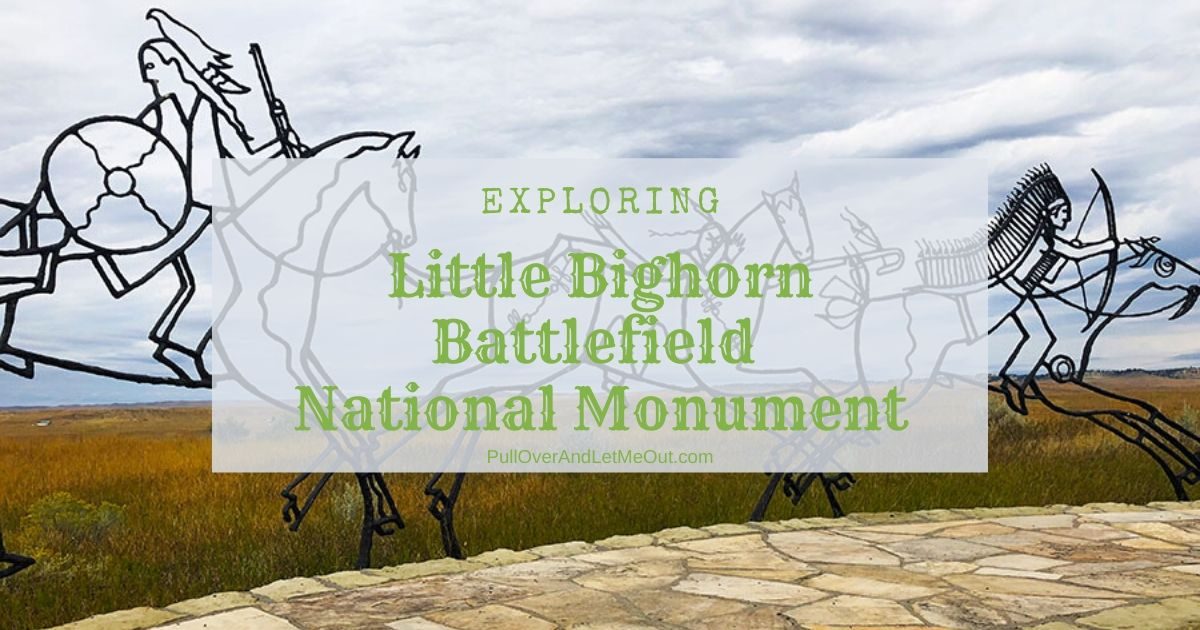Have you ever found yourself at a place you’ve read about in books or seen on television and thought, Wow, I hadn’t imagined I’d be here one day? That’s what it was like when I arrived on the wind-swept plains of south-central Montana at the Little Bighorn Battlefield National Monument. The historic location I had a vague memory reading about in History class, was now right in front of me. Having spent a little time exploring Little Bighorn Battlefield National Monument, I’ve decided to try and answer the question, Is Little Big Horn Battlefield National Monument worth visiting?
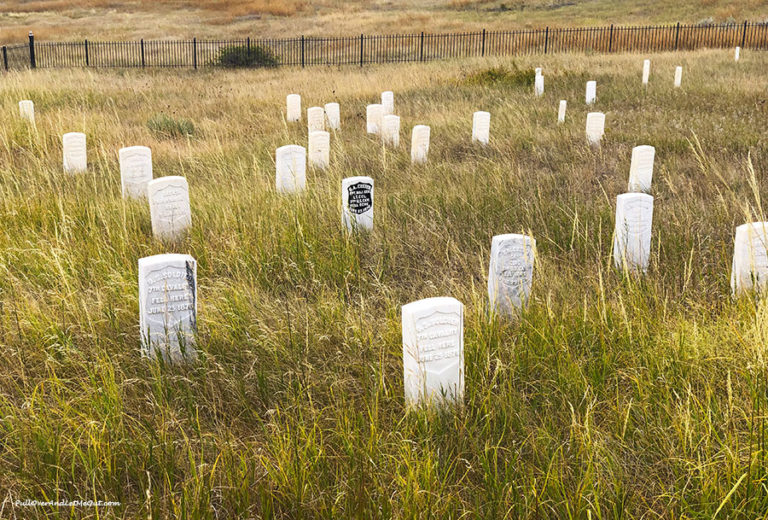
Getting To Little Bighorn Battlefield National Monument
I was in Montana for a travel writers convention that was held in Billings, in September, 2019. One of the many pre-conference tours offered included a trip to Little Bighorn Battlefield National Monument. For an east coast girl with a passion for history, it was a no-brainer. This was the tour for me. There was no way I’d come this far west and not, right? Nonetheless, I had no idea how impactful my visit would be.
The wild grass swaying in the breeze and people strolling the grounds under big gray skies, provided a somber backdrop befitting the events this monument memorializes. As our van drove through the gates, I looked out the window and was struck by the vast open space and couldn’t imagine a battle taking place here.
Touring Little Bighorn
Little Bighorn Battlefield National Monument is part of the National Park Service and as such, is well-staffed with rangers prepared to share the story of this important location. There’s a 25-minute orientation video offered in the visitors center, I recommend viewing before venturing outside. In addition to the video, the museum is brimming with both natural history and cultural collections that set the stage for not just the infamous battle, but that also tell the tale of the land and its inhabitants throughout the ages. You’ll want to allot time to fully experience all the displays and artifacts on site.
Since we were part of a pre-arranged tour, we were fortunate to have Park Ranger, Ken Woody, on hand to give us an overview of the events leading up to and following the fateful battle of June 25 and 26, 1876. We were spellbound as he spoke about the U.S. Army’s 7th Cavalry, the Lakota Sioux, the Cheyenne, and Arapaho tribes. We learned about the Larimer Treaty of 1868 which created a large reservation and also of the U.S. government’s desire for the tribes to forsake their nomadic lifestyle which often brought them into skirmishes with other tribes. We learned of vision quests and heard familiar names like Sitting Bull, Crazy Horse, and General Custer. His discourse was riveting as I noted people who weren’t part of our group moving closer in order to hear his voice over the breeze.
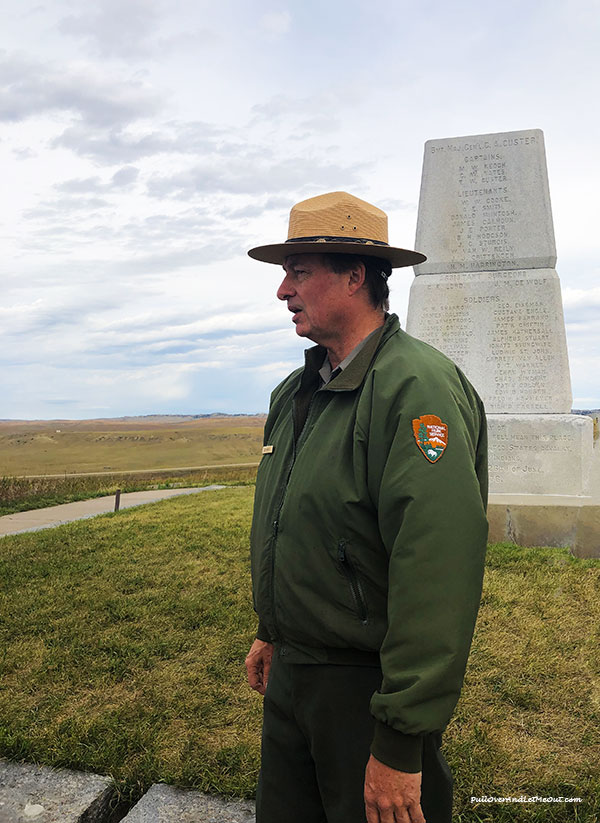

Little Bighorn National Monument offers outstanding educational resources for teachers including, “Expedition Little Bighorn” and a Teacher’s Guide. Visit the Education link on their website for information.
A clash of cultures
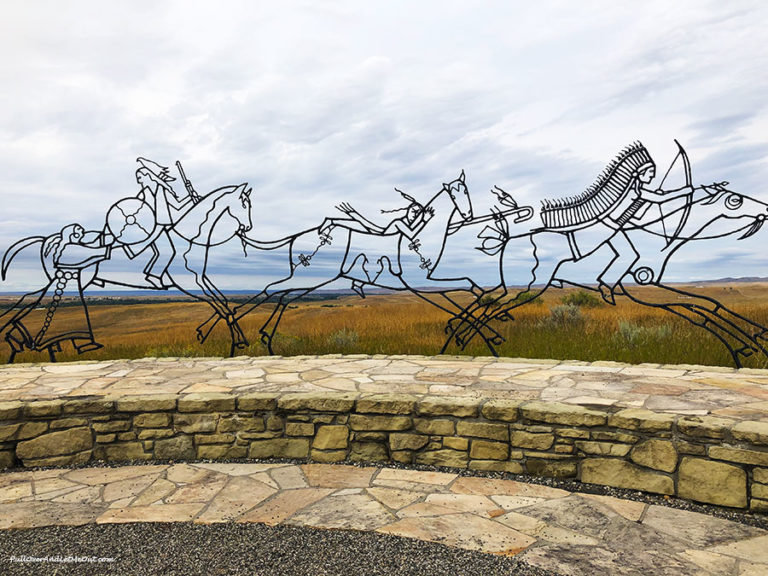
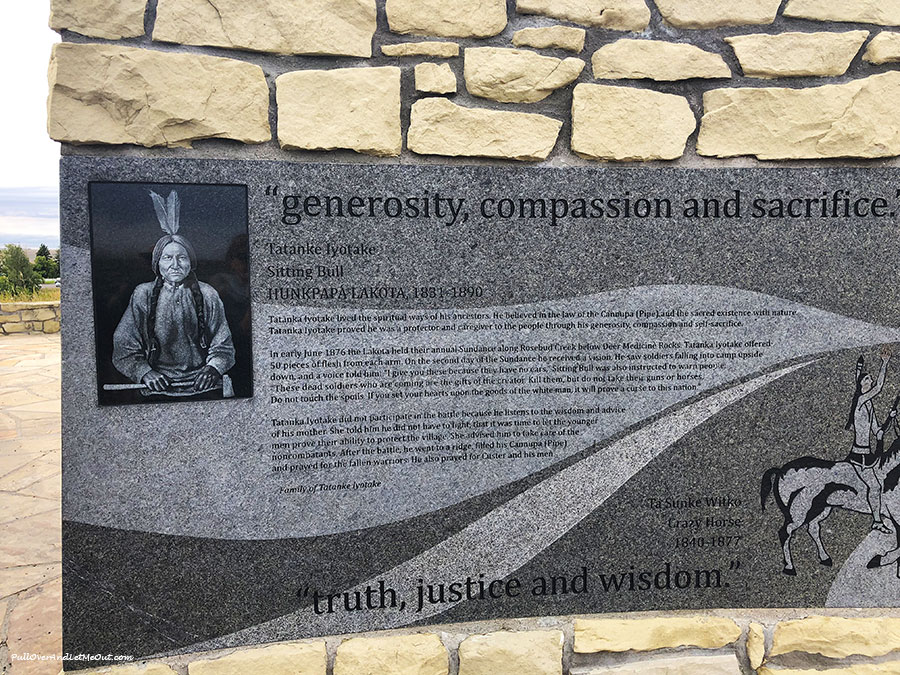
This is an area where tribes would come together. With the Yellowstone, Powder, Rosebud, and Big Horn Rivers nearby, the area was fertile hunting grounds where tribes would celebrate with an annual sun dance ceremony. Ranger Woody provided insights into the Native Americans of the region and deftly recounted the lead up to the clash that ensued.
For me, one of the best parts of listening to the ranger speak was how he simply presented the facts. He didn’t inject opinion, rather, he laid out the events and circumstances preceding and culminating in this clash of cultures. It was moving and thought-provoking, as was spending time at “Peace Through Unity”, the Indian Memorial honoring the Native Americans who died at Little Bighorn in 1876.
Visiting the museum
As I mentioned, you’ll want to give yourself plenty of time in the museum. It’s filled with not only historic relics, but cultural artifacts as well. One can easily spend hours immersed in the exhibits, which include archeological materials excavated from the grounds. There’s also military equipment, weapons, uniforms, and the like. However, the one display that surprised me was dedicated to General George A. Custer.
I didn’t expect to find a tender love story. It was General Custer’s wife, Elizabeth’s “wish that mementos of their life together be shared with the American people.” The exhibit includes a multitude of items General Custer used and she had saved from the time he was at West Point through his days on the Great Plains. It’s a sweet and touching tribute.
What I regret about exploring Little Bighorn Battlefield National Monument
If I were to say I have a regret about my visit to Little Bighorn, it’s that I regret I didn’t have more time. This was our third stop of a day-long tour of south-central Montana and our time was limited. I would have enjoyed further examination of exhibits in the museum and walking the battlefield. Additionally, I didn’t get to Custer National Cemetery which is located on the grounds as well.
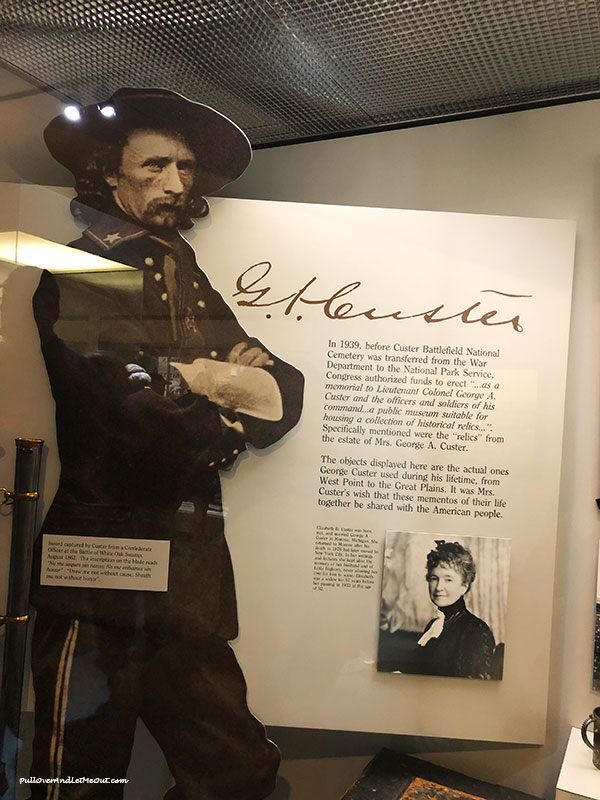
Custer Battlefield Trading Post
After our tour, we made a stop across the road, at Custer Battlefield Trading Post. Located on the Crow Agency which is the governmental headquarters of the Crow Native Americans, the trading post is staffed primarily by Crow. Our stop here was a memorable part of the visit.
We were treated to an enthralling lecture about Crazy Horse followed by an exclusive behind the scenes tour of the kitchen to learn how they make their trademark Native American Fry Bread. And yes, we got to sample! It’s delicious and they serve up the golden lightly fried treat in a variety of ways. In addition to the restaurant portion of the trading post, there is an extensive gift shop filled with a variety of souvenirs, books, jewelry, and clothing. The trading post is busy during the summer months, but worth waiting if you plan to dine and shop. You can also support the local Crow economy via their online store. I bought a t-shirt made of the softest cotton to commemorate my visit.
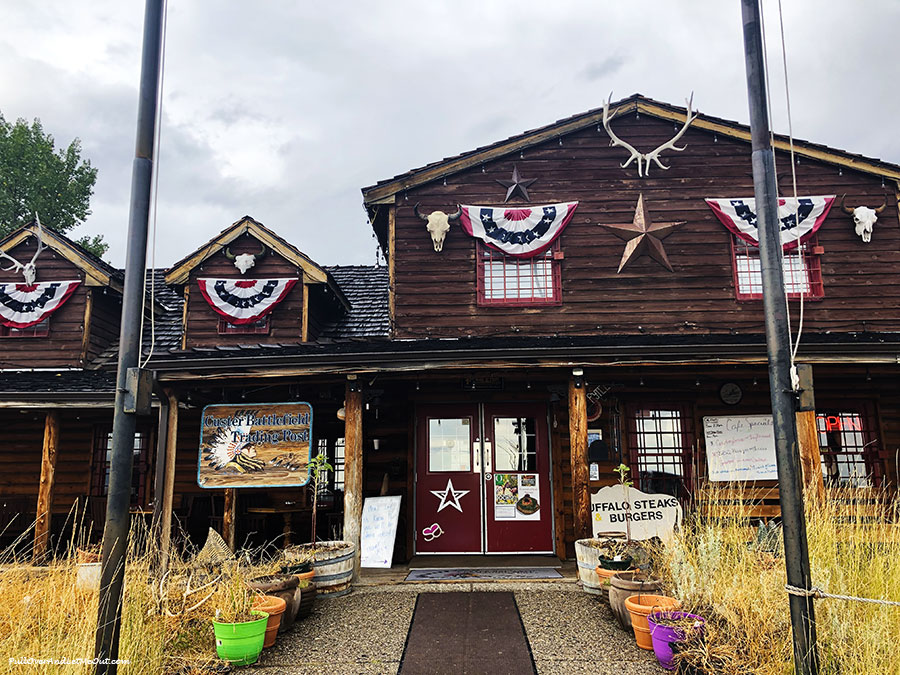
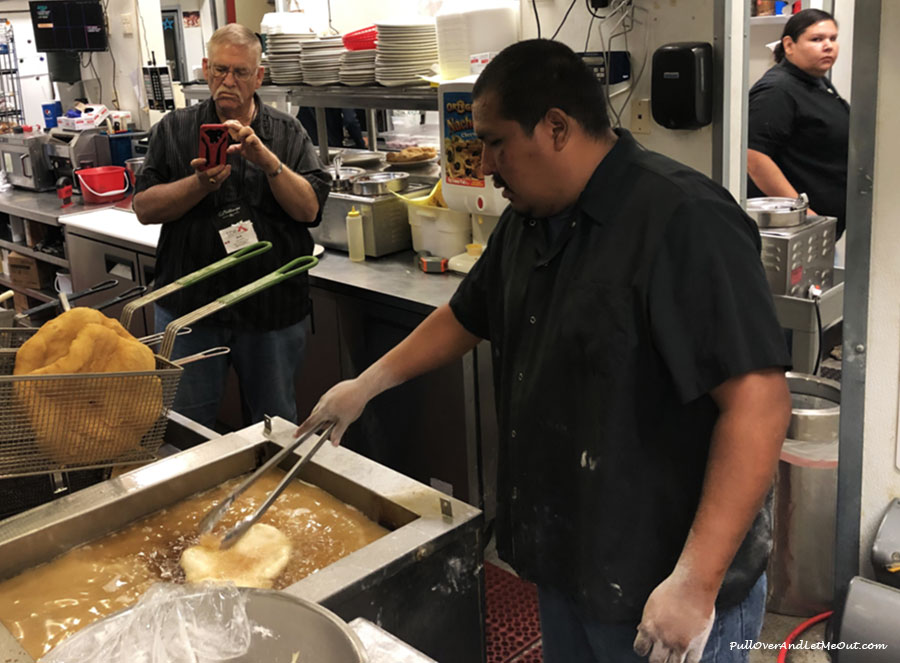
Tips for planning your visit
When visiting and exploring Little Bighorn Battlefield National Monument, it’s important to give yourself at least two to three hours. In addition to the museum, monument, Final Stand Hill, Indian Memorial, and Custer National Cemetery, there’s also the Deep Ravine Trail and tour road to the Reno-Benteen Battlefield, which was the second-stage of the Battle of Little Bighorn. You can easily spend an entire day deep-diving into this historic setting.
Little Bighorn Battlefield National Monument is an hour east of Billings, Montana. Its setting is a high grass plain, and the weather is noted for its extremes. On our visit, the wind was constant and it was cool in the upper 50s on September 10th. I was glad I had my jacket and a scarf with me. You may also wish to explore the battlefield and cemetery so consider your footwear when planning your visit. You’ll be walking.
Little Bighorn is a National Park. The admission for a non-commercial vehicle is $25 but there are five days each year when admission is free. You’ll want to check their website for details such as seasons, hours, and pet visitors. There are park rangers and plenty of informational signs, but should you prefer a guided tour, The Crow Nation Office of Tourism offers one-hour guided tours that begin at the visitors center. (link here)
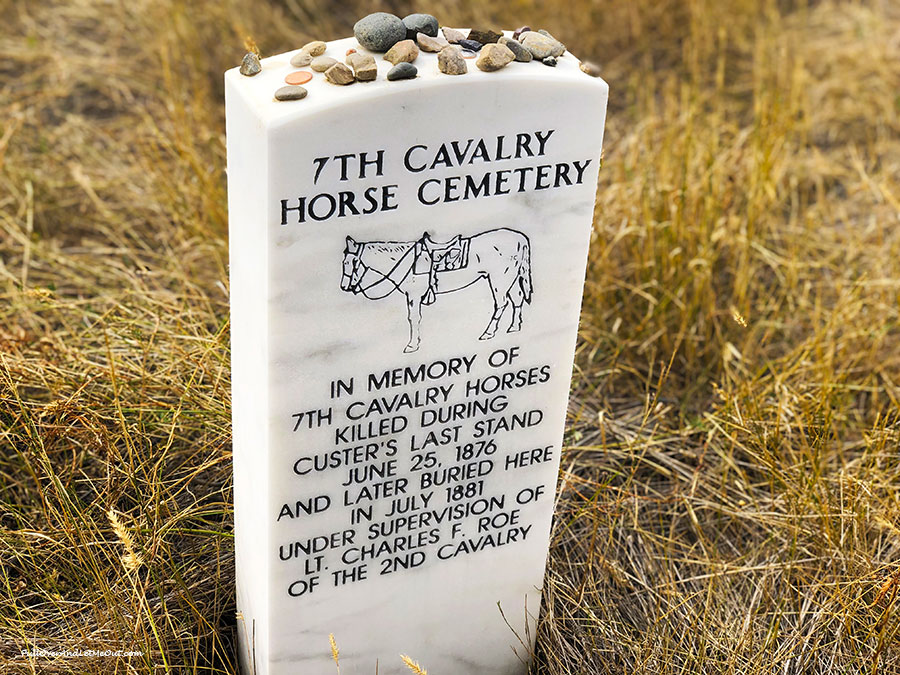
Is Little Bighorn Battlefield National Monument worth visiting?
Yes! Little Bighorn Battlefield National Monument is absolutely worth visiting. The historical significance, the compelling story of the region and its people, the vast openness of the high plains all combine creating an irresistibly poignant experience that will stay with you for years-to-come.
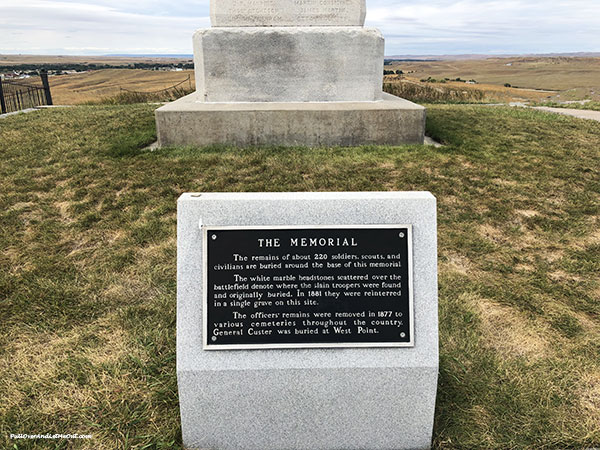
Little Bighorn Battlefield National Monument
P.O. Box 39
Crow Agency, MT 59022-0039
(406) 638-3216
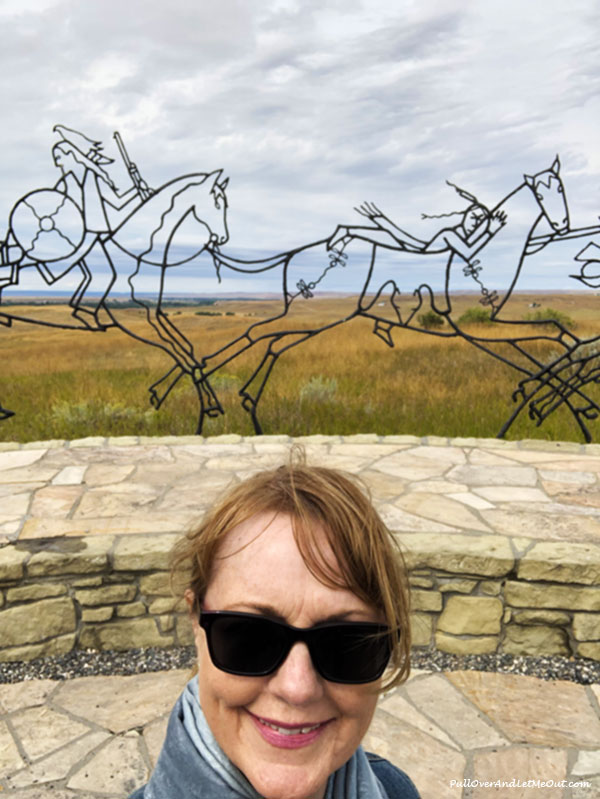
Listen on the go!
Pin This!
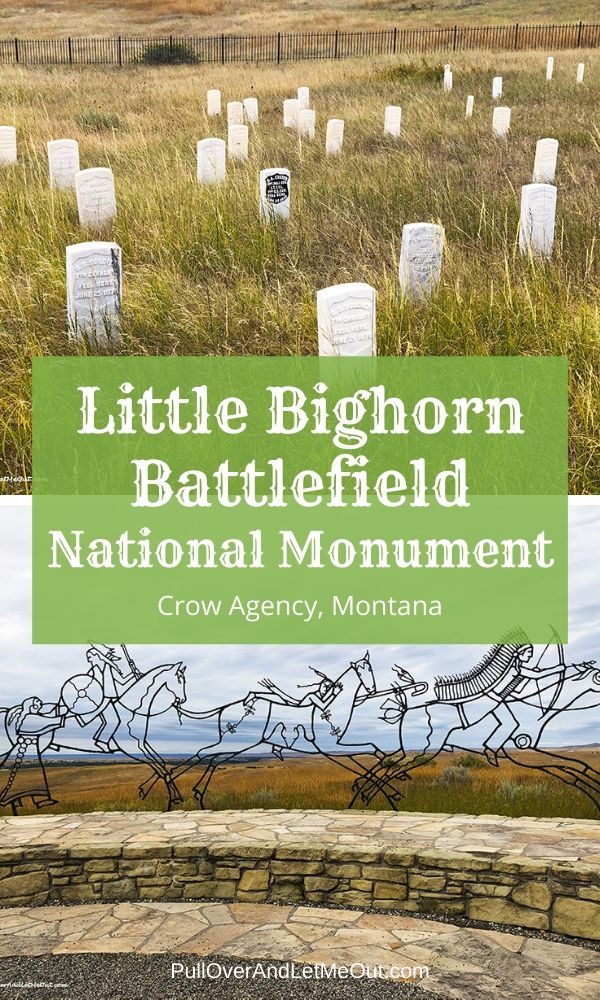
► Plan Your Trip to Little Bighorn Now!
It makes it simple to plan your trip. We’ve pre-filled the destination from the article and if there are multiple places mentioned in the article, we’ve put the one that is best used as your base to see all of the places mentioned.
Just select I’M STAYING and enter the travel dates and hit SEARCH. It automatically uses the first place in the article.
For a multi-day trip, if you stay near that location, you should be able to use it as your base.
Super simple. Just click on the pencil and enter the name of any place mentioned in the story. Or you can enter any address or even the name of a company if you are mixing business and pleasure.
Just click I’M DRIVING and you can see how long it will take, get driving directions and even rent a car if you need one.
Yes, we guarantee the best published rates on hotels. Click on the link for BEST RATE 110% GUARANTEE for details.
Share your experiences
Hey pinners, save this for pinning after your trip

Read More!

Hobby-Inspired Travel: Turn Your Passions into Unforgettable Adventures
With the growing popularity of “slow-travel” many travelers are deciding to lean into their favorite hobbies when planning a trip. Rather than rushing to see everything, hobby-inspired travel encourages a deeper connection with a destination. It’s an approach that leads to more meaningful adventures–no matter what your passion may be.

Plan Your America 250 Trip: Road Trip Tips for 2026
2026 marks America’s 250th birthday—a perfect reason to hit the road and explore the history, culture, and hidden gems that shaped the nation. From major celebrations in cities like Philadelphia and Washington, D.C., to quiet small towns off the beaten path, this guide offers practical tips for planning a memorable trip. Discover how to map your route, check event calendars, avoid crowds, and uncover Pull Over and Let Me Out moments—scenic stops, local eateries, and unique landmarks that make history feel alive. Make your 250th adventure both manageable and unforgettable.

Yadkin Valley Winter Wine & Beer Passport: What to Know Before You Go
Winter and wine go together perfectly. Especially in North Carolina’s Yadkin Valley where the Yadkin Valley Winter Wine & Beer Passport offers a fun and unique way to sip and savor during the cooler months.

